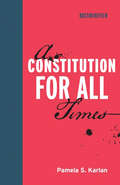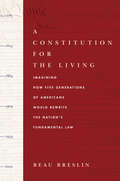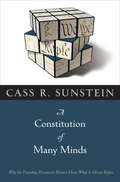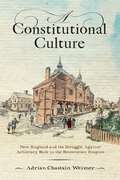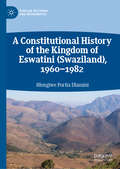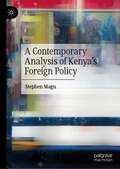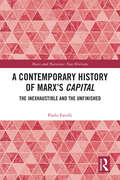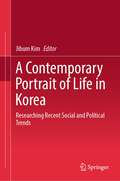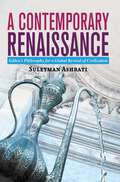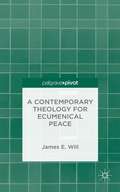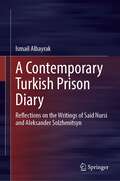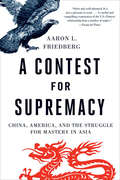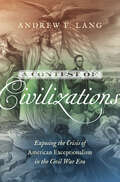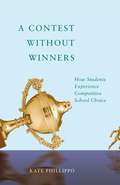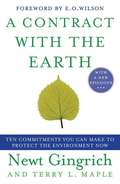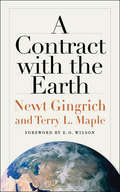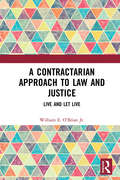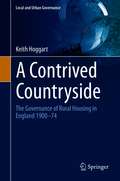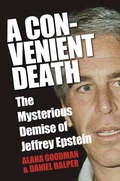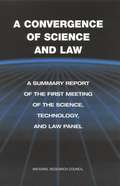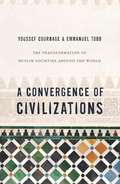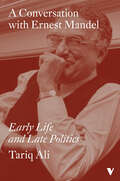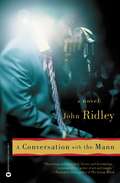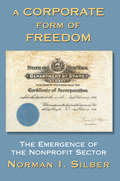- Table View
- List View
A Constitution for All Times (Boston Review Books)
by Pamela S. KarlanA prominent lawyer and legal scholar describes her vision of an evolving Constitution, examining current legal issues that range from health care to gun control.Pamela S. Karlan is a unique figure in American law. A professor at Stanford Law School and former counsel for the NAACP, she has argued seven cases at the Supreme Court and worked on dozens more as a clerk for Justice Harry Blackmun. In her first book written for a general audience, she examines what happens in American courtrooms—especially the Supreme Court—and what it means for our everyday lives and to our national commitments to democracy, justice, and fairness. Through an exploration of current hot-button legal issues—from voting rights to the death penalty, health care, same-sex marriage, invasive high-tech searches, and gun control—Karlan makes a sophisticated and resonant case for her vision of the Constitution. At the heart of that vision is the conviction that the Constitution is an evolving document that enables government to solve novel problems and expand the sphere of human freedom. As skeptics charge congressional overreach on such issues as the Affordable Care Act and even voting rights, Karlan pushes back. On individual rights in particular, she believes the Constitution allows Congress to enforce the substance of its amendments. And she calls out the Roberts Court for its disdain for the other branches of government and for its alignment with a conservative agenda.
A Constitution for the Living: Imagining How Five Generations of Americans Would Rewrite the Nation's Fundamental Law
by Beau BreslinWhat would America's Constitutions have looked like if each generation wrote its own? "The earth belongs...to the living, the dead have neither powers nor rights over it." These famous words, written by Thomas Jefferson to James Madison, reflect Jefferson's lifelong belief that each generation ought to write its own Constitution. According to Jefferson each generation should take an active role in endorsing, renouncing, or changing the nation's fundamental law. Perhaps if he were alive today to witness our seething debates over the state of American politics, he would feel vindicated in this belief. Madison's response was that a Constitution must endure over many generations to gain the credibility needed to keep a nation strong and united. History tells us that Jefferson lost that debate. But what if he had prevailed? In A Constitution for the Living, Beau Breslin reimagines American history to answer that question. By tracing the story from the 1787 Constitutional Convention up to the present, Breslin presents an engaging and insightful narrative account of historical figures and how they might have shaped their particular generation's Constitution. Readers are invited to join the Founders in candlelit taverns where, over glasses of wine, they debated fundamental issues; to witness towering figures of American history, from Abraham Lincoln to Booker T. Washington, enact an alternate account through startling and revealing conversations; and to attend a Constitutional Convention taking place in the present day. These possibilities come to life in the book's prose, with sensitivity, verve, and compelling historical detail. This book is, above all, a call for a more engaged American public at a time when change seems close at hand, if we dare to imagine it.
A Constitution of Many Minds: Why the Founding Document Doesn't Mean What It Meant Before
by Cass R. SunsteinThe future of the U.S. Supreme Court hangs in the balance like never before. Will conservatives or liberals succeed in remaking the court in their own image? In A Constitution of Many Minds, acclaimed law scholar Cass Sunstein proposes a bold new way of interpreting the Constitution, one that respects the Constitution's text and history but also refuses to view the document as frozen in time. Exploring hot-button issues ranging from presidential power to same-sex relations to gun rights, Sunstein shows how the meaning of the Constitution is reestablished in every generation as new social commitments and ideas compel us to reassess our fundamental beliefs. He focuses on three approaches to the Constitution--traditionalism, which grounds the document's meaning in long-standing social practices, not necessarily in the views of the founding generation; populism, which insists that judges should respect contemporary public opinion; and cosmopolitanism, which looks at how foreign courts address constitutional questions, and which suggests that the meaning of the Constitution turns on what other nations do. Sunstein demonstrates that in all three contexts a "many minds" argument is at work--put simply, better decisions result when many points of view are considered. He makes sense of the intense debates surrounding these approaches, revealing their strengths and weaknesses, and sketches the contexts in which each provides a legitimate basis for interpreting the Constitution today. This book illuminates the underpinnings of constitutionalism itself, and shows that ours is indeed a Constitution, not of any particular generation, but of many minds.
A Constitutional Culture: New England and the Struggle Against Arbitrary Rule in the Restoration Empire (Early American Studies)
by Adrian Chastain WeimerIn A Constitutional Culture, Adrian Chastain Weimer uncovers the story of how, more than a hundred years before the American Revolution, colonists pledged their lives and livelihoods to the defense of local political institutions against arbitrary rule.With the return of Charles II to the English throne in 1660, the puritan-led colonies faced enormous pressure to conform to the crown’s priorities. Charles demanded that puritans change voting practices, baptismal policies, and laws, and he also cast an eye on local resources such as forests, a valuable source of masts for the English navy. Moreover, to enforce these demands, the king sent four royal commissioners on warships, ostensibly headed for New Netherland but easily redirected toward Boston. In the face of this threat to local rule, colonists had to decide whether they would submit to the commissioners’ authority, which they viewed as arbitrary because it was not accountable to the people, or whether they would mobilize to defy the crown.Those resisting the crown included not just freemen (voters) but also people often seen as excluded or marginalized such as non-freemen, indentured servants, and women. Together they crafted a potent regional constitutional culture in defiance of Charles II that was characterized by a skepticism of metropolitan ambition, a defense of civil and religious liberties, and a conviction that self-government was divinely sanctioned. Weimer shows how they expressed this constitutional culture through a set of well-rehearsed practices—including fast days, debates, committee work, and petitions. Equipped with a ready vocabulary for criticizing arbitrary rule, with a providentially informed capacity for risk-taking, and with a set of intellectual frameworks for divided sovereignty, the constitutional culture that New Englanders forged would not easily succumb to an imperial authority intent on consolidating its power.
A Constitutional History of the Kingdom of Eswatini (African Histories and Modernities)
by Hlengiwe Portia DlaminiSwaziland—recently renamed Eswatini—is the only nation-state in Africa with a functioning indigenous political system. Elsewhere on the continent, most departing colonial administrators were succeeded by Western-educated elites. In Swaziland, traditional Swazi leaders managed to establish an absolute monarchy instead, qualified by the author as benevolent and people-centred, a system which they have successfully defended from competing political forces since the 1970s. This book is the first to study the constitutional history of this monarchy. It examines its origins in the colonial era, the financial support it received from white settlers and apartheid South Africa, and the challenges it faced from political parties and the judiciary, before King Sobhuza II finally consolidated power in 1978 with an auto-coup d’état. As Hlengiwe Dlamini shows, the history of constitution-making in Swaziland is rich, complex, and full of overlooked insight for historians of Africa.
A Contemporary Analysis of Kenya’s Foreign Policy
by Stephen MaguThis book presents a comprehensive analysis of Kenya's foreign policy decisions, examining its pivotal role in global affairs and its interplay with regional and international dynamics. Through an insightful exploration of Kenya's national security concerns and diplomatic engagements, the book delves into the intricate nexus between geography, political stability, and foreign policy.Featuring a near-chronological examination, the book is organized thematically, with each chapter analysing Kenya's multifaceted foreign policy landscape. From exploring the genesis of Kenya's foreign policy to unravelling the political intricacies of territorial integrity and regionalism, the book illuminates the nation's historical journey in the global arena. Drawing on empirical research, it presents the complexities of Kenya's involvement in regional conflicts and its substantial contributions to international peacekeeping efforts. Furthermore, it offers a nuanced understanding of Kenya's engagement in global multilateral platforms, shedding light on its contributions to the UN Security Council and other international governing bodies. By critically analysing the socio-economic implications of global policies such as the Washington Consensus and Structural Adjustment Programs, the book details the intricate web of influences shaping Kenya's economic landscape and its intricate relations with other nations. Engaging readers with a deep exploration of Kenya's role in addressing humanitarian crises and its response to global challenges, the book provides a compelling narrative on how a seemingly 'small power' can significantly influence broader global dynamics. By emphasizing the intricate relationship between local challenges and global implications, the book serves as an indispensable guide for scholars, policymakers, and global stakeholders seeking to comprehend the nuanced interplay of geopolitics, diplomacy, and regional security within the broader context of the Global South.
A Contemporary History of Marx’s Capital: The Inexhaustible and the Unfinished (Marx and Marxisms)
by Paolo FavilliPaolo Favilli provides both students and scholars with an original reading of themes and issues found in Karl Marx’s Das Kapital and its connections with present- day challenges. By way of continuous cross- referencing between present and past, Favilli demonstrates that claims regarding the scientific status of Das Kapital, advanced by countless texts since its original publication, are themselves deeply imbued by the ‘spirit of the times’. If in 1963 Jean-Paul Sartre could write that Marxism was the unsurpassable philosophical horizon of our times, what could make an undergraduate student today consider such a claim plausible?Informed by the latest research on Marxist theory and decades of teaching the Philosophy of History, Favilli employs a didactic approach stimulating student engagement and learning opportunities in the classroom. This approach allows for a better understanding of relationship between the present and the multiple temporalities that characterise and periodise the contemporary era. What follows is a critique of the contemporary academy for its hangover of post-1989 nuovismo (cult of novelty) and inability to make the proper distinctions between Marxism-as-party-state, the works of Karl Marx, and Marxism as an object of history. This led to the spectacle where after 1989, those who had spent most of their careers as Marxist-hued scholars not only abandoned this identity but also spurned any recognition that Marx and Marxism were worthwhile objects of enquiry.This book was first published in Italian as A proposito de ‘Il capitale’..., Il lungo presente e i miei studenti. Corso di storia contemporanea (Milan: FrancoAngeli, 2021). This English translation includes a new foreword by the author.
A Contemporary Portrait of Life in Korea: Researching Recent Social and Political Trends
by Jibum KimThis book delves into the values, attitudes, and behaviours of Koreans over the course of the past twenty years. Compiled by leading Korean scholars, the book uses the Korean General Social Survey (KGSS), the most comprehensive source of information detailing recent continuity and change in Korea, and addresses a diverse, wide-range of topics such as nationalism, familyism, social inequality, politics, religion, welfare, trust, attitudes towards North Korea, and attitudes towards sex. These issues, in continuously shaping and influencing the lives of Koreans, deserve further examination so as to fully grasp a deeper understanding of Korean contemporary culture. Each chapter covers an overview of background information about the chapter subject and then compares Korean attitudes to those of other countries, drawing on cross-national data derived from sources such as the International Social Survey Programme (ISSP) and the East Asian Social Survey (EASS). It collates this data and then unpacks it to demonstrate trends and how they are impacted by stability or change. Despite the rapid economic development and democratization in Korea, it remains difficult to pinpoint common denominators regarding recent social trends in Korea, and there are surprisingly few books that present a current, nuanced, and empirically substantiated scholarly depiction of Koreans and their social issues. This book fills this gap in serving as an indispensable reference for students and scholars interested in the diverse issues in Korean society.
A Contemporary Renaissance: Gulen's Philosophy for a Global Revival of Civilization
by Sulayman AshratiAshrati's book is a study of intellectual framework laid out by Fethullah Gulen in his call for the revival of humanity's changing power. Gulen, a prominent scholar of Islam and a social activist, is the inspiration behind the global network of education, charity and interfaith dialogue. This book is an attempt to show how significant Gulen's layout for reconstruction is to Islam and to the rest of the world.In his analysis of Gulen's thought of reconstruction, Ashrati looks at concepts including the strategy of nonviolence, spiritual dimension of revival, foundations of humanism in Islam, intellectual and spiritual leadership, men of service, and integration of science and religion. His analogy of construction and architectural work comes handy in understanding both the complexity and openness of the call for revival by Gulen.
A Contemporary Theology for Ecumenical Peace
by James E. WillA biblical, theological, and ethical discussion of the Abrahamic religions commitment to universal peace from a primarily Christian perspective to sustain contemporary praxis.
A Contemporary Turkish Prison Diary: Reflections on the Writings of Said Nursi and Aleksander Solzhenitsyn
by Ismail AlbayrakThis book explores the religious experiences of two notable figures who endured severe trials under authoritarian regimes: Bediuzzaman Said Nursi (1877–1960) within the Islamic tradition, and Aleksander Solzhenitsyn (1918–2008) within the Russian Orthodox Christian tradition. Against the tumultuous backdrop of the twentieth century’s spiritual, social, political, and intellectual upheavals, both Nursi and Solzhenitsyn grappled with immense hardships because of their beliefs. Despite immense tribulations, both individuals demonstrated unwavering faith and resilience in the face of adversity, continuing their scholarly and literary activities. The current study centers on the dichotomy of spiritual confinement and expansiveness, illustrating how people can experience spiritual distress even without physical restraints. It explores the historical and conceptual aspects of imprisonment within Christian and Muslim perspectives, explores the reasons for Nursi and Solzhenitsyn's incarceration, examines their coping mechanisms in the face of hardship, and underscores the role of faith and spirituality. The author integrates personal experiences, particularly his own incarceration during the aftermath of the 2016 Turkish staged coup attempt, within the context of the narratives of Nursi and Solzhenitsyn. The book addresses court proceedings, release, departure from Turkey, and resettlement in Australia. Throughout, the author draws parallels between their own observations and those of Nursi and Solzhenitsyn, contributing to the broader discourse on individual spirituality and collective consciousness. The book offers insights into spiritual resilience in the face of adversity, utilizing the lives of these figures to illuminate shared human experiences. A unique collation of personal narration and scholarly reflection, it is relevant to academics and students in history, political science, sociology, Islamic and Middle Eastern studies, and to social scientists researchingthe phenomenon of exile and prison in different countries across the world. It also speaks to the work of activists and policymakers in human rights.
A Contest for Supremacy: China, America, and the Struggle for Mastery in Asia
by Aaron L. Friedberg"Sober and well-informed. . . . A careful and compelling examination of the U.S.-Chinese relationship from a number of angles."--Financial Times There may be no denying China's growing economic strength, but its impact on the global balance of power remains hotly contested. Political scientist Aaron L. Friedberg argues that our nation's leaders are failing to act expeditiously enough to counter China's growing strength. He explains how the United States and China define their goals and reveals the strategies each is now employing to achieve its ends. Friedberg demonstrates in this provocative book that the ultimate aim of Chinese policymakers is to "win without fighting," displacing the United States as the leading power in Asia while avoiding direct confrontation. The United States, on the other hand, sends misleading signals about our commitments and resolve, putting us at risk for a war that might otherwise have been avoided. A much-needed wake-up call to U.S. leaders and policymakers, A Contest for Supremacy is a compelling interpretation of a rivalry that will go far to determine the shape of the twenty-first century.
A Contest of Civilizations: Exposing the Crisis of American Exceptionalism in the Civil War Era (Littlefield History of the Civil War Era)
by Andrew F. LangMost mid-nineteenth-century Americans regarded the United States as an exceptional democratic republic that stood apart from a world seemingly riddled with revolutionary turmoil and aristocratic consolidation. Viewing themselves as distinct from and even superior to other societies, Americans considered their nation an unprecedented experiment in political moderation and constitutional democracy. But as abolitionism in England, economic unrest in Europe, and upheaval in the Caribbean and Latin America began to influence domestic affairs, the foundational ideas of national identity also faced new questions. And with the outbreak of civil war, as two rival governments each claimed the mantle of civilized democracy, the United States' claim to unique standing in the community of nations dissolved into crisis. Could the Union chart a distinct course in human affairs when slaveholders, abolitionists, free people of color, and enslaved African Americans all possessed irreconcilable definitions of nationhood? In this sweeping history of political ideas, Andrew F. Lang reappraises the Civil War era as a crisis of American exceptionalism. Through this lens, Lang shows how the intellectual, political, and social ramifications of the war and its meaning rippled through the decades that followed, not only for the nation's own people but also in the ways the nation sought to redefine its place on the world stage.
A Contest of Ideas: Capital, Politics and Labor
by Nelson LichtensteinFor more than thirty years Nelson Lichtenstein has deployed his scholarship--on labor, politics, and social thought--to chart the history and prospects of a progressive America. A Contest of Ideas collects and updates many of Lichtenstein's most provocative and controversial essays and reviews. These incisive writings link the fate of the labor movement to the transformations in the shape of world capitalism, to the rise of the civil rights movement, and to the activists and intellectuals who have played such important roles. Tracing broad patterns of political thought, Lichtenstein offers important perspectives on the relationship of labor and the state, the tensions that sometimes exist between a culture of rights and the idea of solidarity, and the rise of conservatism in politics, law, and intellectual life. The volume closes with portraits of five activist intellectuals whose work has been vital to the conflicts that engage the labor movement, public policy, and political culture.
A Contest without Winners: How Students Experience Competitive School Choice
by Kate PhillippoSeeing the consequences of competitive school choice policy through students&’ eyesWhile policymakers often justify school choice as a means to alleviate opportunity and achievement gaps, an unanticipated effect is increased competition over access to coveted, high-performing schools. In A Contest without Winners, Kate Phillippo follows a diverse group of Chicago students through the processes of researching, applying to, and enrolling in public high school. Throughout this journey, students prove themselves powerful policy actors who carry out and redefine competitive choice.Phillippo&’s work amplifies the voices of students—rather than the parents, educators, public intellectuals, and policymakers who so often inform school choice research—and investigates how students interact with and emerge from competitive choice academically, developmentally, and civically. Through students&’ experiences, she shows how competitive choice legitimates and exacerbates existing social inequalities; collides with students&’ developmental vulnerability to messages about their ability, merit, and potential; and encourages young people&’s individualistic actions as they come to feel that they must earn their educational rights. From urban infrastructure to income inequality to racial segregation, Phillippo examines the factors that shape students&’ policy enactment and interpretation, as policymakers and educators ask students to compete for access to public resources.With competitive choice, even the winners—the lucky few admitted to their dream schools—don&’t outright win. A Contest without Winners challenges meritocratic and market-driven notions of opportunity creation for young people and raises critical questions about the goals we have for public schooling.
A Contract with the Earth
by Newt Gingrich Terry MapleFormer Republican Speaker of the House Gingrich, teaming up with Maple (conservation and behavior, Georgia Institute of Technology), addresses environmental issues by rhetorically reprising his signature Contract with America legislative agenda of the 1990s. The new Contract with the Earth rests on 10 key principals: affirm US leadership on environmental issues; provide incentives to "environmental entrepreneurs;" move towards clean technologies; make government a facilitator for entrepreneurial, private sector innovation and private-public partnerships; become "aspirational and inspirational" by reducing the "arbitrary power of our federal bureaucracy;" mobilize the American public behind agreed-on policies; encourage scientific and technical literacy; promote non-partisanship on the environment; encourage strategic environmental philanthropy; and "enlist the nation." Gingrich and Maple defend and expand upon these principals and discuss some of the issues connected with its implementation over the course of the text. Annotation ©2008 Book News, Inc., Portland, OR (booknews.com)
A Contract with the Earth
by Newt Gingrich Terry L. MapleFocusing the environmental debate on the principle of common commitment, former Speaker of the House Newt Gingrich and eminent conservationist Terry L. Maple present A Contract with the Earth. They declare a need for bipartisan environmentalism—a new era of environmental stewardship with principles that they believe most Americans will share. While acknowledging that liberals and conservatives do not see eye to eye on many issues, Gingrich and Maple argue successfully that environmental stewardship is a mainstream value that transcends partisan politics. Their thoughtful approaches to our environmental challenges are based on three main premises: environmental leadership is integral to America's role in the world, technologically savvy environmental entrepreneurs can and should be the cornerstone of environmental solutions, and cooperation and incentives must be dramatically increased to achieve workable and broadly supported environmental solutions.Gingrich and Maple believe that most people—regardless of how they categorize themselves politically—are weary of the legal and political conflicts that prevent individuals and communities from realizing the benefits of environmental conservation. The foundation of the book—a ten-point Contract with the Earth—promotes ingenuity over rhetoric as the way forward.
A Contractarian Approach to Law and Justice: Live and Let Live
by William E. O’Brian Jr.This book presents a distinctive version of a contractarian approach to law and justice. The work argues that law and justice are social norms that arise from a process of social evolution, and are binding only if and to the extent that they are mutually beneficial. It explicitly rejects accounts of law and justice that are based on morality, on the basis that morality itself is only legitimately founded on mutual advantage. But it also rejects most existing versions of contractarianism, which are based on ideas of hypothetical agreements by rational contractors, in favour of an approach that is based on actually existing social norms, but advocates critically examining these norms and discarding those that are not truly mutually beneficial. The first half of the book develops the approach, while the second half explores some of its implications for law. It argues for a left-libertarian approach to property, an approach largely based on the common law of tort, contract and criminal law, and a rejection of most statutory law, which is based not on mutual advantage but rather on benefiting some at the expense of others. However, it ultimately recognises that there are those who want a more extensive state than this approach allows, and advocates a strong form of federalism to allow this, provided robust exit rights are provided. The book combines political philosophy, economics and law into an approach that is broadly libertarian but distinctive in many respects. It will be of interest to scholars in all three of those disciplines.
A Contrived Countryside: The Governance of Rural Housing in England 1900–74 (Local and Urban Governance)
by Keith HoggartThis book shows how governance regimes before the 1970s suppressed rural prospects of housing improvement and created conditions for middle-class capture. Using original archival sources to reveal the intricacies of local and national policy processes, weak rural housing performances are shown to owe more to national governance regimes than local under-performance. Looking `behind the scenes' at policy processes highlights neglected principles in national governance, and shows how investigating rural housing is fundamental to understanding the national scene. With original insights and a new analytical perspective, this volume offers evidence and conclusions that challenge mainstream assumptions in public policy, housing, rural studies and planning.
A Convenient Death: The Mysterious Demise of Jeffrey Epstein
by Daniel Halper Alana GoodmanA must-read for fans of the Netflix docuseries Filthy Rich: The full investigation of the shocking death of billionaire Jeffrey Epstein and those powerful enough to have orchestrated it. In A Convenient Death, investigative reporters Alana Goodman and Daniel Halper search for the truth of what really happened to Jeffrey Epstein. With access to Epstein's victims and lawyers, to doctors, Wall Street insiders and law enforcement officers, they reveal the dirty secrets and sinister ties that may have driven someone in Epstein&’s circle to take matters into their own hands. On the morning of August 10, 2019, Epstein, friend and financier to the rich and powerful, was found unresponsive in his prison cell in lower Manhattan, where he awaited his second trial for sexual predation and other crimes. He was rushed to a local hospital and one hour later pronounced dead by suicide. Across the world, a sinister web of powerful billionaires, celebrities, and politicians, including Bill and Hillary Clinton, had reason to sigh with relief at news of Epstein&’s death. Having flown on his private planes and visited his many homes—the sites of so many illicit activities—they had much to lose if their transgressions were ever exposed. And now, Epstein was silenced for good. But cracks in the official story soon emerged. And the questions kept coming: · Why did the surveillance cameras in front of Epstein&’s cell stop working that night? · Why was Epstein's cellmate transferred out and never replaced? · Why was a high-profile prisoner so suddenly taken off suicide watch and left unguarded for eight hours? Was Epstein murdered to protect the powerful people who feared what he might reveal? The American public deserves to know the truth. With this book, they can finally understand the facts and decide for themselves.
A Convergence Of Science And Law: A Summary Report Of The First Meeting Of The Science, Technology, And Law Panel
by National Research Council Staff Technology Science Law Panel StaffThis report is a summary of the first meeting of the Science, Technology, and Law Panel. The Policy Division of the National Research Council established the panel to bring the science and engineering community and the legal community together on a regular basis to explore pressing issues, to improve communication, and to help resolve such issues between these communities.
A Convergence of Civilizations: The Transformation of Muslim Societies Around the World
by Youssef Courbage Emmanuel ToddWe are told that Western/Christian and Muslim/Arab civilizations are heading towards inevitable conflict. The demographics of the West remain sluggish, while the population of the Muslim world explodes, widening the cultural gap and all but guaranteeing the outbreak of war. Leaving aside the media's sound and fury on this issue, measured analysis shows another reality taking shape: rapprochement between these two civilizations, benefiting from a universal movement with roots in the Enlightenment. The historical and geographical sweep of this book discredits the notion of a specific Islamic demography. The range of fertility among Muslim women, for example, is as varied as religious behavior among Muslims in general. Whether agnostics, fundamentalist Salafis, or al-Qaeda activists, Muslims are a diverse group that prove the variety and individuality of Islam. Youssef Courbage and Emmanuel Todd consider different degrees of literacy, patriarchy, and defensive reactions among minority Muslim populations, underscoring the spread of massive secularization throughout the Arab and Muslim world. In this regard, they argue, there is very little to distinguish the evolution of Islam from the history of Christianity, especially with Muslims now entering a global modernity. Sensitive to demographic variables and their reflection of personal and social truths, Courbage and Todd upend a dangerous meme: that we live in a fractured world close to crisis, struggling with an epidemic of closed cultures and minds made different by religion.
A Conversation with Ernest Mandel: Early Life and Late Politics
by Ernest Mandel Ali TariqAn interview with leading Marxist economist and historian Ernest MandelErnest Mandel was one of the leading Marxist intellectuals of the 20th century. His impact on the generation of the Sixties extended way beyond his political affiliation to the Fourth International. The SDS in Germany and its US equivalent read his work avidly. In France, too, all his key writings were published and debated. His pamphlet 'An Introduction to Marxist Economic Theory' sold a quarter of a million copies worldwide and his master-work Late Capitalism (published by Verso) was debated on every continent.This interview with Tariq Ali was conducted in 1987. The plan was to make a 90-minute film on his life and work, but the project faltered and the interview is one of the few remnants. Mandel's rediscovery is overdue.
A Conversation with the Mann
by John RidleyAn evocative novel of an aspiring black comics rise to near-fame and fortune during the Rat Pack era, by the author of Everybody Smokes in Hell and Stray Dogs. What do you want? I want the Ed Sullivan Show. At the dawn of the Civil Rights Movement, like a lot of black Americans, comedian Jackie Mann wanted to be somebody. And for him there was only one way to achieve that: to make it big. Make it, no matter the cost: friends, family, one's own self-esteem and self-respect. This is the story of a young man's journey from Harlem to stardom, a story of Hollywood royalty, New York glitterati, Vegas Mafiosi, Northern bigotry, and Southern racism. This is a story of love, honor, betrayal, and redemption; of fame bought and paid for by any means necessary. It is the story of one man's desire and an entire race's demands, and the incredible moment when the two came together as one. This is the story of Jackie Mann.
A Corporate Form Of Freedom: The Emergence Of The Modern Nonprofit Sector
by Norman SilberA Corporate Form of Freedom explores how courts and legislatures have decided which nonprofit groups can pursue their missions as corporations. For many years it was a privilege to hold a nonprofit charter. This view changed during the 1950s and 1960s. A new generation contended that legal theory, racial justice, and democratic values demanded that the nonprofit corporate form be available to all groups as a matter of right. As a result, nonprofit corporate status became America's corporate form for free expression. The new perspective did more than enlarge public discourse, however. It also reduced official authority to supervise or otherwise hold nonprofit organizations accountable for their activities. Norman I. Silber examines how the nonprofit world was transformed -- a transformation which refashioned political and social discourse, altered the economy, and created many of the difficulties the nonprofit sector faces today.
